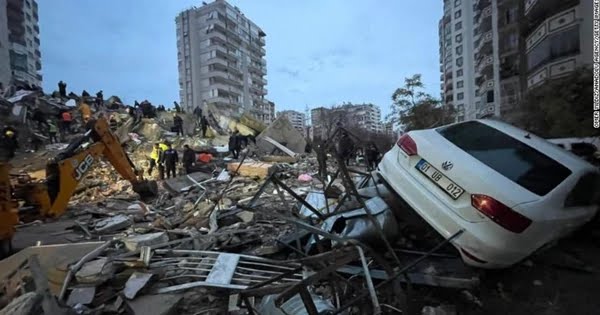
Earthquake
Hope running thin as death toll hits 2,000 Morocco earthquake
Hope is running thin as recue operations in Morocco earthquake continues today, 24 hours after the terrible incident occurred.
The temblor struck late on Friday with the epicentre 75km west of Marrakesh, Morocco’s fourth-largest city, reports Al Jazeera.
A magnitude 6.8 earthquake has hit Morocco killing at least 2,012 people, injuring more than 2,059, damaging ancient buildings, and sending terrified residents fleeing their homes into the streets for safety.
Troops and emergency services scrambled on Saturday to reach remote mountain villages, the epicentre of the quake, where casualties are still feared trapped, as authorities declared three days of national mourning in the wake of the deadliest quake in decades.
Montasir Itri, a resident of the mountain village of Asni near the epicentre, said most houses there were damaged. “Our neighbours are under the rubble and people are working hard to rescue them using available means in the village,” he said.
Residents of Marrakesh, the nearest big city to the epicentre, said some buildings collapsed in the old city, a UNESCO World Heritage site. Local television showed images of a fallen mosque minaret with rubble lying on smashed cars.
The Interior Ministry urged calm saying in a televised statement the quake hit the provinces of Al Haouz, Ouarzazate, Marrakesh, Azilal, Chichaoua and Taroudant.
The temblor hit shortly after 11pm local time (22:00 GMT) on Friday evening, according to the United States Geological Survey (USGS).
The USGS estimated the epicentre occurred in the Atlas Mountains, some 75km (44 miles) from Marrakesh, the fourth largest city in the country.
Search teams frantically scoured collapsed buildings for those trapped.
“The Royal Armed Forces, local authorities, security services and civil protection … continue to mobilise and harness all means and capabilities in order to intervene, provide the necessary assistance, and assess the damage,” the interior ministry said.
Journalist Noureddine Bazine from Marrakesh described the situation as an “horrific night”.
“It was chaos the moment the earthquake happened, we’re still try to process what happened because it was so sudden,” he told Al Jazeera. “In Marrakesh, the most damage was in the old city because the buildings are prone to collapse because of their fragile state.”
Eid al-Tarazi, a professor of seismology in Jordan, told Al Jazeera “hundreds of aftershocks could happen”.
“People will need to stay away from the buildings that are not strong because they are prone to collapse. We expect the aftershocks could continue for three to four weeks,” he said.
Local media reported roads leading to the mountain region around the epicentre were jammed with vehicles and blocked with collapsed rocks, slowing rescue efforts.
Abderrahim Ait Daoud, the head of a town in the area, told the Moroccan news site 2M that several homes nearby had partly or totally collapsed, and electricity and roads were cut off in some places.
He also said authorities were working to clear roads in al-Haouz province to allow passage for ambulances and aid to populations affected. Large distances between mountain villages mean it will take time to learn the full extent of the damage, he added.
Moroccans posted videos showing buildings reduced to rubble and dust, and parts of the famous red walls that surround the old city in Marrakesh damaged.
Tourists and others posted videos of people screaming and evacuating restaurants in the city. Shocked residents in Marrakesh and Casablanca fled out of buildings and onto the streets.
